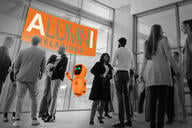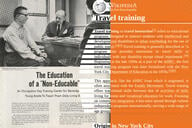You have /5 articles left.
Sign up for a free account or log in.
A group of liberal arts colleges and research universities are exploring how they could share expertise and services through a Digital Liberal Arts Exchange, easing the burden on colleges to be jacks-of-all-trades and allowing them to specialize in what they do best.
The initiative is being led by Michael D. Roy, dean of the library at Middlebury College. In an interview, he said he adapted the idea for the exchange from a “babysitter consortium” his and several other families used to participate in. Instead of trusting the safety of their children to high school students, parents would enlist other families in the consortium, he said.
The DLAx aims to give researchers the confidence that their other children -- their projects -- are in good hands. Middlebury received a $46,000 planning grant from the Andrew W. Mellon Foundation to support the project.
“You need to have a trusted network,” Roy said. “Building on that idea, the notion of this planning grant is to explore what a trusted network would look like that would allow members of this consortium to collaborate in deep and meaningful ways in order to share expertise and services."
The exchange is primarily meant to give digital humanities scholars support for projects that might not exist on their campuses, but the plan is for colleges to share more than the services provided by their libraries and centers of excellence. In the future, faculty members at one college could use the exchange to find a different college that offers application development support, for example, but also to host their digital projects and find a database of vetted speakers.
The DLAx is in some ways a response to the pressure on colleges, universities and their libraries to offer a stream of new expertise and services -- and do it without significantly larger budgets. Roy said that development can be seen in job listings libraries post asking applicants who are comfortable with multiple coding languages, publishing platforms and digital research and teaching tools.
“You need a small army,” Roy said.
Ideally, enough colleges will join the exchange to make it a self-sustaining organization without charging membership fees, Roy said. Instead of paying to participate, a college would contribute its expertise in data visualization, for example.
“Rather than having all the specialization residing on your campus, you could end up specializing in one area and turn to the exchange when you have a project that requires a specialization that’s not on your campus,” Roy said.
However, Roy said he could imagine a situation where some colleges simply paid a fee and other contributed services. In any case, the success of the exchange will depend on the number of participating colleges and the different services they offer.
“You need critical mass, and I think we’re still trying to figure out what that would be,” said John Unsworth, vice provost for library and technology services, chief information officer and university librarian at Brandeis University. “Partly that’s a matter of deciding on scope, both geographically and institutionally.”
The planning grant helped bring together volunteers such as Unsworth and fund a survey of 90 faculty members, librarians, IT staffers and others at a variety of different colleges. Part of the survey asked respondents to rate the digital scholarship services they currently offer, services they would like to offer but do not have the resources for, and services that could be provided remotely. Application development, data and text mining, data management, database development and text encoding stood out in the survey results. The exchange is also seeking input through a crowdsourcing platform.
William G. Thomas III, the John and Catherine Angle Professor in the Humanities at the University of Nebraska at Lincoln, said the exchange formalizes some of what researchers already do. A meeting at a conference or a research grant could lead to a collaboration across institutions, but the exchange will make those partnerships less dependent on chance, he said.
“It’s an effort to bridge some traditional divides, particularly between small liberal arts colleges and research universities,” Thomas said. “The next generation of research might flow from greater collaboration across some divides that have prevented some scholars from being able to conduct certain kinds of research.”
The exchange is already revealing some potential connections between universities. Thomas said Nebraska could contribute its text encoding expertise, while it would look for help with game design and digital media object production. Brandeis, meanwhile, has experience running a “MakerLab” -- a community workspace -- but could turn to the exchange for help with text encoding, Unsworth said.
Since the DLAx is still in an early planning stage, details are still subject to change. Roy plans to more clearly define what the exchange will do in an upcoming grant application, which could be finalized by the end of March. The exchange itself could launch in September, he said.
For now, the exchange’s website lists five main goals. In addition to colleges contributing and obtaining services, the exchange may offer shared infrastructure for hosting digital projects, a speaker’s bureau and community building services.




